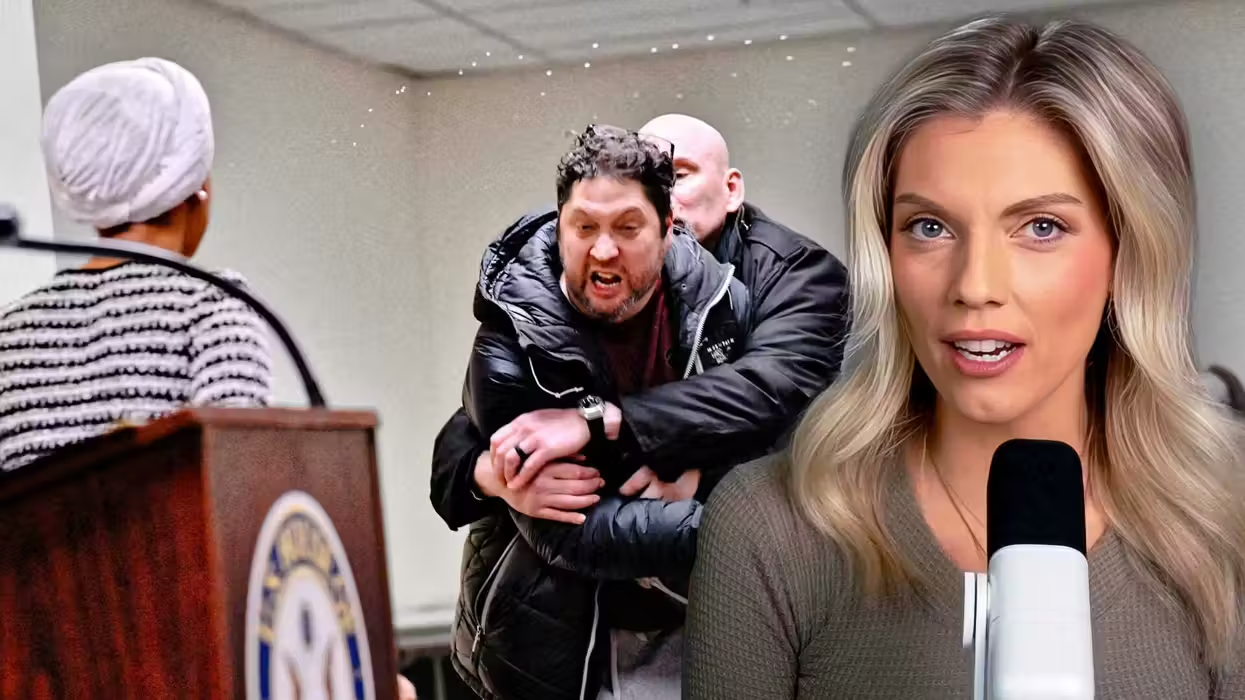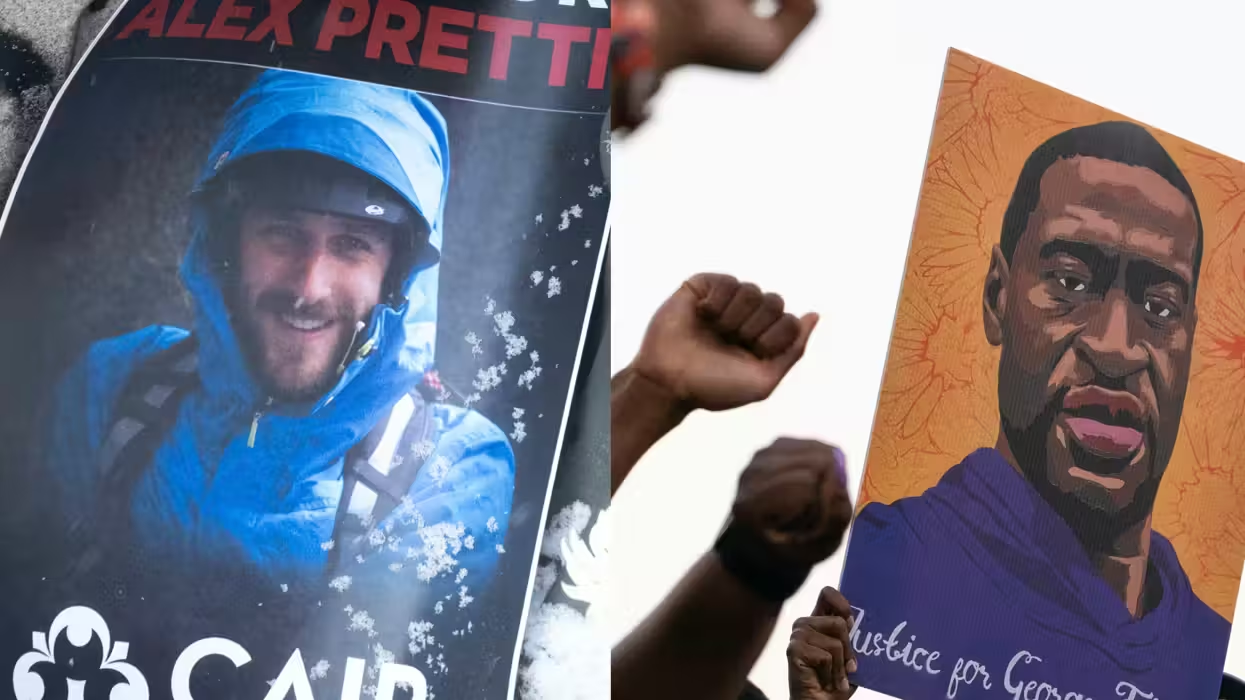Twenty-three-year-old Genesis Carmona is not the first beauty queen to be killed in Venezuela, but she is the first one to die while protesting peacefully for Venezuelan liberties.
Is there anything we can do to prevent more deaths as this one?
 A motorcyclist carries Venezuelan model Genesis Carmona, injured during an anti-government protest in Valencia on February 18, 2014. The 21-year-old model died on February 19, 2014 after suffering a gunshot wound to the head in the protest march, a hospital source told AFP. AFP PHOTO /MAURICIO CENTENO
A motorcyclist carries Venezuelan model Genesis Carmona, injured during an anti-government protest in Valencia on February 18, 2014. The 21-year-old model died on February 19, 2014 after suffering a gunshot wound to the head in the protest march, a hospital source told AFP. AFP PHOTO /MAURICIO CENTENO
“Socialism or Death” proclaimed the late Hugo Chávez. With the highest murder rate of any country, a more appropriate slogan should be “Socialism is Death.” If these street protests by Venezuelan civil society and the violent response by government forces the administration of President Maduro ends unscathed, there will be more young innocent victims and the U.S. might soon have to live with an increasingly hostile country much closer to its borders than troubled Ukraine.
It will become a more attractive safe-haven for enemies of the free society.
It is not just the pervasive presence of agents of the Cuban dictatorship. Iran’s role in Latin America is also growing. Four years ago the Wilson Center published "Iran in Latin America: Threat or 'Axis of Annoyance?'"
It describes the numerous Iranian-Venezuelan joint ventures and stresses the common policy goals and outlook of the regimes of the late Hugo Chávez and Ahmadinejad’s Iran. Since then Iranian presence has continued to grow.
Joseph Humire, the director of the Secure Free Society project, who is writing a book, "Iran's Strategic Penetration of Latin America," argues:
“Aside from serving as a regional hub for Iranian-proxy Hezbollah, Venezuelan territory also serves as a base for Iranian intelligence and military officials who provide command and control support to more sophisticated projects in the region that establish plausible deniability for Iran’s military ambitions.”
Humire also cautions about the potential increase in improperly documented Iranian migrants traveling north through the Western Hemisphere (namely to Canada) via Caracas.
 In this Saturday, Feb. 22, 2014 photo, anti-government protesters take cover during clashes with riot police in Caracas, Venezuela. After their opposition rally broke up in the late afternoon, in a pattern that has been seen in past demonstrations, stragglers erected barricades of trash and other debris and threw rocks and bottles at police and National Guardsmen. The troops responded with volleys of tear gas to prevent the students from reaching a highway and blocking traffic. (AP Photo/Rodrigo Abd)
In this Saturday, Feb. 22, 2014 photo, anti-government protesters take cover during clashes with riot police in Caracas, Venezuela. After their opposition rally broke up in the late afternoon, in a pattern that has been seen in past demonstrations, stragglers erected barricades of trash and other debris and threw rocks and bottles at police and National Guardsmen. The troops responded with volleys of tear gas to prevent the students from reaching a highway and blocking traffic. (AP Photo/Rodrigo Abd)
Its abuses will become an example for others to replicate.
The strategies of 21st century Venezuelan socialists to use the rules of democracy to subvert the Republic and achieve permanent power have been copied by other governments in the region, such as Bolivia and Ecuador. Their methods to stifle freedom of expression will also be imitated.
During these last few days the regime in Venezuela censored the Colombian news channel NTN24. NTN24 has never been an ideological channel, but it creates a place for multiple voices. That is unacceptable for totalitarians. CNN suffered a similar fate.
As blogger Alek Boyd, of infodio.com narrates, not long ago we saw how “Globovision was choked with tax investigations and other measures until a group of Boligarchs bought it, how the regime has starved critical newspapers of foreign currency so that paper can't be imported, or the little known acquisition of Venezuela's largest newspaper conglomerate (Cadena Capriles) by proxies of Chavista governor Tareck el Aissami.”
Using its “Bolivarian Media and Information System”— the regime has built its own media empire. It is getting harder to find a healthy media competition to support.
 Venezuela's President Nicolas Maduro, right, and First Lady Cilia Flores wave to supporters at a pro-government rally with elderly people in Caracas, Venezuela, Sunday, Feb. 23, 2014. Maduro has been scrambling to squash an increasingly militant opposition movement after two weeks of anti-government protests against crime and inflation. (AP Photo/Rodrigo Abd)
Venezuela's President Nicolas Maduro, right, and First Lady Cilia Flores wave to supporters at a pro-government rally with elderly people in Caracas, Venezuela, Sunday, Feb. 23, 2014. Maduro has been scrambling to squash an increasingly militant opposition movement after two weeks of anti-government protests against crime and inflation. (AP Photo/Rodrigo Abd)
Those who are fighting for their freedoms in Venezuela deserve help. CEDICE Libertad think tank is a prime candidate. In the 2013 edition of the think tank ranking produced by the University of Pennsylvania, CEDICE came out ranked number one among free-market groups in Latin America. With more than 40,000 Twitter followers, it also leads in several measures of social media impact. Despite all the turmoil it has managed to survive and in April it should celebrate its 30th anniversary, hopefully in Caracas.
Also active is the Human Rights Foundation (HRF), led by Thor Halvorssen Mendoza. This nonpartisan organization a few days ago called for the release of opposition leader Leopoldo López, who is today the most famous political prisoner in the Americas. Halvorssen was born in Caracas in 1976 but HRF is based in the U.S. and acts globally, it organizes the Oslo Freedom Forum, which The Economist magazine described as a "spectacular human-rights festival... on its way to becoming a human-rights equivalent of the Davos economic forum."
Another good way to help is to support some of the groups with lower over-head and more media-impact-for-the-buck such the Hispanic American Center of Economic Research (mostly devoted to Latin America). A creative avenue is to place advertisements in for-profit media sites that defend the free society and have good coverage of Venezuela, such as Panampost.com, El Ojo Digital (Argentina), Altavoz in Peru, and El Diario Exterior in Europe. These efforts are beyond the reach of the Venezuelan government.
 Venezuelans protest against the government of Venezuelan President Nicolas Maduro along Paseo de la Reforma in Mexico City, Sunday, Feb. 23, 2014. Venezuela's opposition has been protesting for the last two weeks against rampant crime, over 50 percent inflation and shortages of basic goods. (AP Photo/Marco Ugarte)
Venezuelans protest against the government of Venezuelan President Nicolas Maduro along Paseo de la Reforma in Mexico City, Sunday, Feb. 23, 2014. Venezuela's opposition has been protesting for the last two weeks against rampant crime, over 50 percent inflation and shortages of basic goods. (AP Photo/Marco Ugarte)
With a little more homework you can find out if your favorite church, brotherhood, international NGO, or trade or academic association has members in Venezuela, if they do, and if they stand for freedom, find a way to help through them. Totalitarian governments target intermediary societies: organizations that come between the state and the individuals that are beyond their control. If they turn society into a collection of individuals detached from family, church, trade associations, and other independent mediating societies, they will turn “democracy” into a game of numbers. In a game of numbers, the many win.
In order to control these intermediary associations, the government created the Bolivarian Militias, a quasi-parallel army of street fighters. Then they added to it. Through the “United Socialist Party” they created the “collectives,” which, much like the Fascist “Blackshirt” thugs of Mussolini, work alongside traditional State forces without any constitutional restraint.
The United States continues to be the most important trading partner of Venezuela. It imports close to 40 percent of Venezuelan exports. Thirty percent of Venezuelan imports come from the U.S.
With trade of such magnitude, it is natural that a major portion of the business deals are with government agents. CITGO, with over 13,000 gas stations, is owned by the Venezuelan state, and has approximately 10 percent of the U.S. market.
I for one stopped purchasing gas at CITGO and I think it is time to target those who profit from the regime. With the billions controlled by the Venezuelan government and its cronies inside and outside the country, there are many from all sides of the political spectrum who seek economic and political advantage by dealing with socialists of the 21st century.
The road to post-Chávez continuity by the Maduro regime has been paved with billions of dollars and careful manipulation. If friends of freedom do not help Venezuelans now, an increasingly hostile government will create more costly challenges to the U.S.
–
TheBlaze contributor channel supports an open discourse on a range of views. The opinions expressed in this channel are solely those of each individual author.

 A motorcyclist carries Venezuelan model Genesis Carmona, injured during an anti-government protest in Valencia on February 18, 2014. The 21-year-old model died on February 19, 2014 after suffering a gunshot wound to the head in the protest march, a hospital source told AFP. AFP PHOTO /MAURICIO CENTENO
A motorcyclist carries Venezuelan model Genesis Carmona, injured during an anti-government protest in Valencia on February 18, 2014. The 21-year-old model died on February 19, 2014 after suffering a gunshot wound to the head in the protest march, a hospital source told AFP. AFP PHOTO /MAURICIO CENTENO






